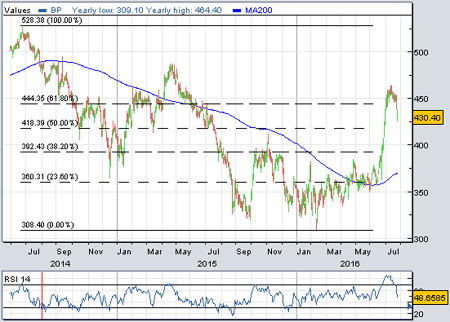High-yielding BP profit dives
26th July 2016 12:09
by Harriet Mann from interactive investor
Share on
Independent of the Brexit fall-out, share price has soared by a fifth since the EU referendum as investors ignored uncertainties in the oil industry for protection against recent macro risk.
However, the oil giant has just reported a near-halving of profits in the second quarter, just as oil prices take a fresh lurch lower. BP shares continue to yield well over 6%, though, after maintaining the dividend, which is turning into a bellwether of sentiment - if it goes, the industry will with it.
Underlying replacement cost profit - a specific accounting measure for the oil industry - crashed by another 45% to $720 million (£549 million) in the second quarter, although this was 26% higher than the previous period as efficiencies fed through to the bottom line.
Cash costs are now $5.6 billion lower than two years ago and BP reckons this will widen to $7 billion by 2017. With organic capital expenditure totalling $7.9 billion in the first half, management has earmarked $17 billion for project investment this year.
Profit from BP's downstream business - refining and marketing - slipped by a fifth to $1.5 billion and its upstream segment - exploration and production (E&P) - crashed from $494 million to $29 million year-on-year. E&P earnings did swing back into profit from a $747 million loss in the previous three months, however.

These lower cash costs and smaller exploration write-offs went some way to offset the impact from the weakest second-quarter refining margins since 2010 and lower oil prices. Brent oil averaged $46 a barrel across the three months, higher than the $34 seen in previous period but well below $62 last year.
The group is getting closer to its aim of rebalancing its sources and use of cash in a $50-55 per barrel price range. This will hopefully mean the group keep paying the generous dividend, maintained this time at 10 cents per share.
BP made $1.9 billion from asset disposals in the first six months, including from the partial sales of its Castrol India stake, and gearing is within its 20-30% target range at 24.7%.
With reliable assets under its wing, operating cash flow totalled $5.5 billion before payments for the Deepwater Horizon oil spill. Six years on, the oil giant has finally drawn a line under the Gulf of Mexico disaster after paying out $61.6 billion in liabilities.
"BP today is a stronger, more focused and more disciplined company," said chief executive Bob Dudley. "We are managing the business for value over volume. Our relentless group-wide focus on capital and cost discipline is helping BP to become much more efficient while maintaining the investment needed for future growth."
Looking forward
And after months of stripping back costs to survival mode, the group can look forward. It’s got a wave of new major upstream projects waiting in the wings - adding 500,000 barrels of oil equivalent per day (boepd) of production capacity by the end of next year, growing to 800,000 boepd by 2020. Strategies like its new Aker BP venture should increase that further.
The oil industry is seen as rather safe from any Brexit uncertaintyBP's share price has had a great 2016 so far. Its share price has surged by 50% from February lows, but has done especially well since the EU referendum, with its market value up by a fifth since 23 June. Operating against its own macro fundamentals, the oil industry is seen as rather safe from any Brexit uncertainty.
We reported recently that Barclays oil analyst Lydia Rainforth thinks BP shares are worth 600p. "Transformation [since the Deepwater Horizon disaster] does take time and the real benefit to the bottom line and cashflow should become increasingly evident over the next 18 months," she wrote.
After peaking above the 62% Fibonacci retracement level earlier this month, BP's share price has dipped 7% over the last fortnight, losing 2% to 430p Tuesday. It's not helped that Brent crude is down from over $52 a barrel last month to just $44 currently.
Oil demand is tipped to weaken, while production in Canada is recovering after the recent forest fires. Even Nigeria is pumping more than before, although output there is unpredictable.
This article is for information and discussion purposes only and does not form a recommendation to invest or otherwise. The value of an investment may fall. The investments referred to in this article may not be suitable for all investors, and if in doubt, an investor should seek advice from a qualified investment adviser.